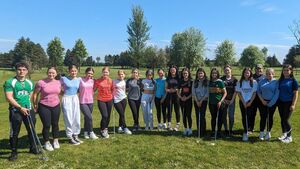Life skills sport teaches are invaluable

On Friday, May 10 last a group of 22 Transition Year students from St Nathy's College came to try out the facilities at first hand under the guidance of Mr. Brady, (S.N.C.), Christy McCann, Anne O'Brien , Breege Flanagan and Patricia Reid. For many it was their first time getting to grips with teeing off, putting, and pitching. It is hoped that this is the first of many trips to the course for budding golfers of all year groups from the school. Any student interested in taking up golf over the holidays should contact Mr. Brady, Mrs. O'Brien or Ms. Sheridan for further details.
Sport has a wonderful way of unconsciously teaching us many life skills; dedication, commitment, respect, adhering to deadlines, hard work, manners, dealing with emotions, difficult times, to mention a few.
We automatically carry these skills into our everyday life. When a problem arises, our minds and bodies know exactly what to do; through the sporting world we have been here many times before. The mind and body remembers and responds.
When I was younger I played football with my school, club and county, and we didn’t have the facilities that exist today. Ladies football was at a lot lesser level, even though we never felt it because we were so happy just to play the sport with our friends.
We never had many attendees at the matches but never depended on that support because our parents, family and friends always came and that’s all that mattered. We never had the county pitches, but never looked for them because we knew no different.
We were females playing football and it was always going to be different. This taught us to fight though for what we believed in, to not accept being second and to stick up for ourselves. We never had the physios so had our own remedies, treatments and cures; like bandages for anything that was tight, cycling shorts to protect the hamstrings and always deep heat in the bag. We never had food prepared for us but never cared as there was always home cooked food at home, a packed lunch in the bag and we always got to stop at a shop on the way back to school.
We often changed on the side of a pitches; no dressing rooms, no showers, no water, no coffee mugs but we never got sick as our immune systems were accustomed to a little hardship. Now in the running world where one must change quickly after training in the woods, the side of the forest is sheltered compared to a pitch. The kids nowadays cannot fathom how one can change outdoors!
If you were not feeling well the evening of a match, you were told you’d sweat it out. A fast sprint would cure you and to cycle home would loosen the legs out, and so it did. We believed in this and sometimes I think the mind wins over the body.
One of the most wonderful things sport allows us to do easily is make friends, work with people and become part of a team. We feel a sense of belonging, worth, part of a club, learning social skills to help us participate in society. In a world of technology, rural isolation, less face to face communication and many friendships online, to engage with people and to have fun with people keeps us sane in an ever-demanding world.
I have lifelong friends from sport. Some I did not go to school with, some I would have never met but long-term friendships were built by working together to achieve the common goal which was win matches, win All-Irelands and so we did. One of the many hardest learning experiences was us drawing an All-Ireland final, losing by a last-minute goal in the replay and having to go home and study for exams the next day.
The learning here was no matter how bad the situation is, you get through and there are people going through a lot worse. It makes you stronger and you have people around you to support you through those tough times. Knowing how your friends pass the ball, knowing what they eat on match day, knowing what position they are strongest in, knowing their strengths and weaknesses, us all supporting, helping and encouraging one another, develops a bond and a togetherness that lasts. The friendships developed further with singsongs on the bus, with nights out after matches and with presentation events. We learnt to share, to take turns, that others need a game and that’s OK.
We learnt to have tolerance for others, to respect our team mates and managers because everyone is equal, and togetherness is how we succeed. Team sports require strong personalities, comradery, organisation of the team to achieve the best from teammates. Communication is key to ensure all are aware of team goals and to equally know their roles within the team. The team must work together to achieve the goal. One must learn to pass the ball and not take control, a ball travels faster than a player and so work with the ball. Being part of a team teaches responsibility and accountability, this turns into discipline. With children they listen to their coaches, they follow the rules, they turn up on time, they commit to the cause, they take their turns. All qualities that are developed as they grow older.
Arguments, disagreements, conflict, confrontation are all part of the sporting world but it is how we deal with all of these that is the important factor. In the heat of the moment to take a breath, hold one’s thoughts, to not retaliate, to not use inappropriate words or behaviour that could get us in bother, to let down our teammates or coaches. These behaviours can all be learned, worked on and developed over time. We must respect the referee and officials. Understanding and respecting authority in life is a necessity and in sport, if we want to excel we must follow rules, obey authority and get the job done.
In an intense environment, when our body is getting tired, when the pressure of competition is alive and when our minds are hearing negative thoughts, how to manage our emotions, our responses and most importantly our reactions teaches us how to behave in an appropriate manner throughout our daily lives and hence become a better person.
Different sports teach us different skills and it is this variety that enables us to further excel. Life skills are learnt over a period of time and not just something to be learnt off by heart. Through training every week, we develop and adapt, and we grow and build on our talents. This transfers over to work and our daily lives. We become better at certain chores, we endure certain chores, and sport helps us to learn things such as resilience, leadership, accountability, respect and patience. Some days we are exhausted. We have a bad day, we have a really bad training session, but we evaluate the situation, learn from it and most of all move on. In each and every part of life we have set backs, we can stay sitting down or get back up. Getting through boosts our confidence, our self-esteem and mentally makes us stronger.
As sportspeople we are extremely motivated and enthusiastic because we have to be. If we want to make the team, win the race or compete, we must go out in the bad weather and train, we must commit, we must look forward to each session, have a focus and enjoy it otherwise our motivation will slacken. It teaches us great self-discipline.
In work sometimes people complain and moan. Young people sometimes find going to school hard, having to get up, having to study. In life every day we must do things we might not fully like, our motivation can be positive or negative. Like with sport we can stay looking out at the rain or face it. When we are out it is always grand, work and school will also be always grand. If you look at it in another light, you will enjoy the day. When we work towards something the rewards motivate us to achieve again, to aim higher, to do our best, resulting in sense of achievement and greater life satisfaction.
Working on our skill, our technique, our posture, is important in for many sports, taking pride in our performances, our preparation, having our gear ready, being on time, looking after ourselves. Attention to detail and quality when partaking or training, doing the exact training session when alone, quality is doing the right thing even when no one is watching because you want to do it to perfection, you want it to work on race day. This transfers to our work, our study, doing the best we can and doing our work to the highest standard even when no one is looking.
In most sports’ patience is demanded, taking our time to warm up, to cool down, to stretch, to wait our turn. Everyone must develop patience, all goals are achieved over a period of time, success doesn’t happen overnight, it can take weeks, months or years.
In all sports, the mind must be trained like the body. The mental endurance demanded from our sports involves concentration, focus, sometimes quick reactions, intense decisions, just like when studying for an exam or working towards strict deadlines. We must work hard and train our minds so that we are prepared for the challenge.
In a world where lots of things are outside our control, one must manage what is controllable. Individual sports like running teach us how to spend long periods of time on our own, working through miles of training where one must occupy the mind and overcome the physical challenges to complete the task day after day. It develops an unbelievable strength to achieve the task at hand, to keep going through the tough times, to survive on very little, to focus on our own journey and no one else’s.
Sports require leaders both on and off the field. This involves hard work and we are faced with leadership roles in all areas of life; in a voluntary group, in a family, in work, where one must manage, listen, communicate, gain respect, delegate, negotiate, and adapt to change.
There are many, many, more skills, knowledge and competencies that we all gain across our lifetime from sport. Most importantly we are a better all rounded person for being involved, partaking and enjoying our chosen disciplines. We are on a lifelong journey of development and learning, where every situation teaches us new skills and experience allows us to deal with situations when they arise.
It’s not always about the winning but the journey and the people you meet along the way. Enjoy every part of your journey whatever roads it takes you on and treasure the people you meet along your paths.





